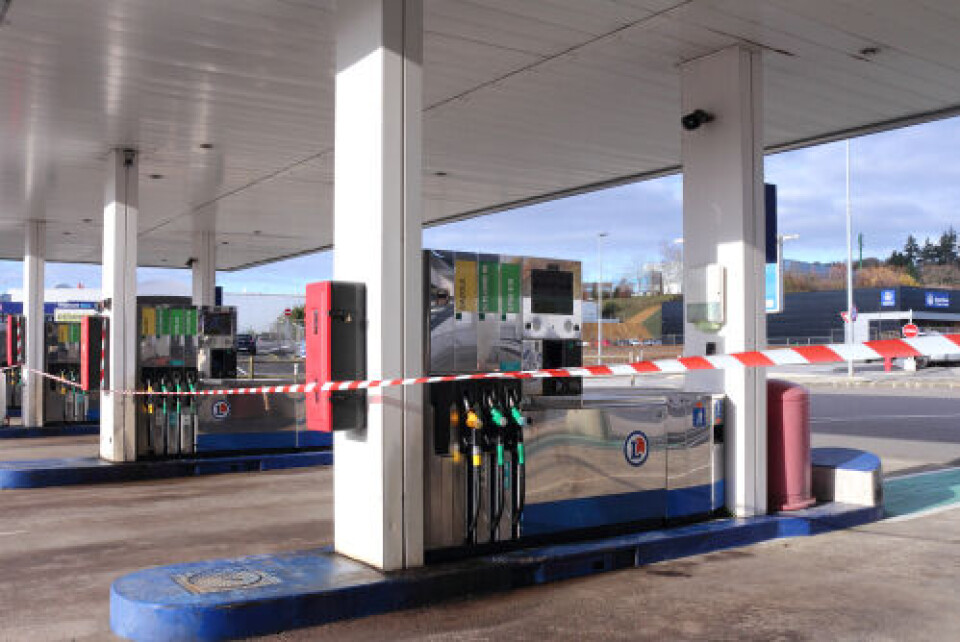-
World corruption: France better than US but worse than UK
High-level public figures in France have a ‘feeling of impunity’, the ranking says
-
Avalanche deaths in France: Why so many this year?
There have already been 12 deaths since Christmas
-
EES: Airports and airlines call for immediate review ahead of summer traffic
Warnings of four-hour delays during peak season as industry leaders ask for extended suspension period
French petrol stations see shortages as pension protests continue
But the French Union of Petroleum Industries said there was enough fuel in reserve and that the situation was not being helped by panic buying

Hundreds of petrol stations across France have begun experiencing fuel shortages amid ongoing blockades at refineries to protest the government’s pension reforms.
Nineteen departments have so far been affected.
The situation is reportedly worse in the west of the country – especially in Sarthe, Indre-et-Loire, and Calvados – where a quarter of stations are running low on petrol or diesel, according to figures from the prix-carburants.gouv.fr website.
So far, 6% of the country’s 10,000 fuel stations were estimated to be experiencing a lack of petrol and diesel on March 8, according to AFP analysis of publicly-available data.
The Union française des industries pétrolières (UFIP) estimated the figure to be closer to 7%. This is directly linked to the pension strikes, it said.
Map: Le Figaro / Fig Data, with data from prix-carburants.gouv.fr
‘No problems with supply’
However, the president of UFIP did admit: “Unfortunately, there are service stations that permanently lack fuel, regardless of any strikes.”
Yet, he said that most do still have adequate supplies, as there are “200 depots in France”.
Depots contain fuel stocks that have already been delivered by the refineries, and they are continuing to supply petrol stations in the majority of cases.
UFIP spokesperson Olivier Gantois sought to reassure drivers, telling FranceInfo today (March 9): “There are no problems with supply at petrol stations today.”
He said that some stations have reported shortages largely because some worried drivers have filled up their tanks completely as a precautionary measure.
Weeks before fuel production stops
"Il n’y a aucun problème d’approvisionnement des stations-services aujourd’hui", indique Olivier Gantois, président de l’Union française des industries pétrolières, porte-parole des pétroliers en France pic.twitter.com/9We6eDDLGd
— franceinfo (@franceinfo) March 9, 2023
Even if the strikes and blockades continue – as they are expected to – the president of the Les Mousquetaires group (which owns Intermarché) said that it would take many more days before stocks run out completely.
Thierry Cotillard told RMC: “Yes, refineries are starting not to deliver. But even if they don’t deliver, we would have emergency stocks from the state to hold on for several days.”
Strikes are expected to continue, especially across TotalEnergies refineries. Union CGT-Chimie today told the AFP that all deliveries were still being blocked from leaving.
Refineries are continuing to produce fuel, which is being stored on-site.
It is estimated that the strikes would have to continue for many more days – or even weeks – before production stops at refineries due to the on-site tanks being full.
Read more: France’s pension reform strikes: what will happen next?
More disruption ahead
Meanwhile, the transport sector is continuing to experience disruption.
Although the main day of strikes took place on Tuesday (March 7), delays and cancellations are still hitting trains and planes in France.
Trains
SNCF said services remain “severely disrupted” on Thursday across most of its lines. The delays are also expected to continue on Friday (March 10).
- On TGV Ouigo and Inoui services, around one-in-three trains overall are running.
- On Eurostar, 75% of services are running
- On Thalys, two-in-three trains are operating
- On Intercité services, only 25% of trains are running
A full list of the services available, operation levels for each line, and the specific RER and metro lines that are out of action can be found in the latest update from SNCF (in French).
Planes
On Wednesday (March 8), the direction générale de l'aviation civile (DGAC) required airlines to cancel 20-30% of their scheduled flights for Thursday (March 9) and Friday (March 10), due to the ongoing strikes by air traffic controllers.
The airports affected include Paris-Charles-de-Gaulle, Paris-Orly, Beauvais, Bordeaux, Lille, Lyon, Nantes, Marseille, Montpellier, Nice, and Toulouse.
Air France said that “almost 80%” of its flights were running, while the low-cost airline Transavia said it had cancelled 30% of its schedule, meaning that 40 to 50 of its usual flights were grounded.
The DGAC said: “Despite these preventative measures, disruption and delays are to be expected [on Thursday, March 9 and Friday, March 10].”
It invited “the passengers who can, to postpone their trip if possible, and to contact their airline before travelling” to check the status of their flight.
It comes after more strike dates have been announced, including this Saturday, March 11, and one – as yet unidentified – day next week. Meanwhile, the controversial article 7, which raises the minimum pension age from 62 to 64, was last night adopted in the Senate (201 votes for, and 115 against) after hours of debate.
France’s work minister Olivier Dussopt said: “It’s first and foremost a responsible vote from the Senate.
“We have disagreements and discussions, that’s normal, but on the question of age, when it comes to responding to the structural deficit, we are going to be able to gradually raise the retirement age.”
Related articles
Why we are on the side of French pension reform strikers
Key takeaways so far from Tuesday’s pension reform strikes in France
Lorry drivers in France called to a no-end date strike from March 5
























